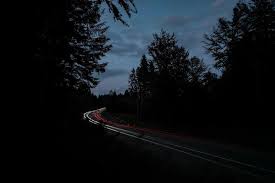
In poetry, contrast can work its magic, too. Past and future. Dream and reality. Invincibility and mortality.
The last works particularly well when examining the one childish outlook we’re least willing to give up—the notion that good times go on forever, that hope is an unsinkable ocean liner, that death comes calling for others with regularity but doesn’t even have us on its to-do list.
Let’s see it at work in three poems:
“Driving into Our New Lives”
Maria Mazziotti Gillan,
Years ago, driving across the mountains
in West Virginia, both of us are so young
we don’t know anything. We are twenty-eight
years old, our children sleeping in the back seat.
With your fresh Ph.D. in your suitcase, we head out
toward Kansas City. We’ve never been anywhere.
We decide to go the long way around
instead of driving due west.
Years ago, driving across mountains; your
hand resting on my knee, the radio playing the folk
music we love, Pete Seeger, Joan Baez, or you
singing songs to keep the children entertained.
How could we know what is to come?
We are young. We think we’ll be healthy
and strong forever. We are certain we are invincible
because we love each other, because our children
are smart and beautiful, because we are heading
to a new place, because the stars
in the coal-black West Virginia sky are so thick,
they could be chunks of ice.
How could we know what is to come?
To steal a phrase from George Orwell, it has a “Such, Such Were the Days” feeling to it. Reading it, one senses how the speaker’s perspective has brought wisdom and sadness in equal measure: “How could we know what is to come? / We are young. We think we’ll be healthy / and strong forever.”
And all based on logical (to capital-R Romantic humans) reasons: love, smart and beautiful children, West Virginia stars, and a new home somewhere beyond the headlights.
I’ve used the contrast between happiness / security and some unknown reckoning myself. The alchemy works if you jigger it just right. First, from Lost Sherpa of Happiness, the perspective of innocence in the animal world:
“Sharp-Shinned Hawk & the Song Sparrow”
by Ken Craft
All spring, the punctured sky collapses blue
beneath the shrill knives of their call.
All day, shriek and talon, eye and hunger
from the heat of a red-black gullet.
They circle overhead, dive under liquid
evergreen, glide through currents of hardwood,
trunk and limb. Nestling, fledgling,
songbird—on ground or mid-flight—
leaving only an orphan feather for changeling.
And here I hear the song sparrow sing.
Here in the narrow interstice between stealth and wait.
Her three notes. Her cheerful trill. Her hesitation
at the wood’s held breath.
Then, song again.
To sun or cloud, maybe. Wind or mate.
She sings to the stillness of quiet’s dull edge.
She sings to not knowing that every joy
in life is answered, eventually.
As with the Gillan poem, there is no need to address the future, as it is implied. The future is a hawk in waiting. An indifferent hawk, blindly following instinct’s edicts, which somehow doubles the affront.
And here, from The Indifferent World, a similar scene, only more domestic:
“Insomnia”
by Ken Craft
Three is the loneliest number on a clock
when the night can’t save you.
No doubt it is the constellated tug,
a conspiracy of stars, the silent, primal
voice that whispers the uselessness,
that grinds greater gears,
that mocks the hubris of careful plans,
set alarms. Every blanketed life around you
sleeps safe and happy and secure
like nothing can touch them, like change
has made its exception, named it you,
and passed finally over the frosted roof.
Contrast. A young family driving toward a life of endless happiness in the West Virginia night. A song sparrow singing blithely while bill and talon bide their time from a branch high above. An insomniac convinced that both change and the future make exceptions.
Readers shake their heads saying, “No, no, no,” while wishing, “Yes, yes, yes” against their better judgment.
That wish is a big part of this brief, lovely journey we call life. I’m not sure where we’d be without it.
